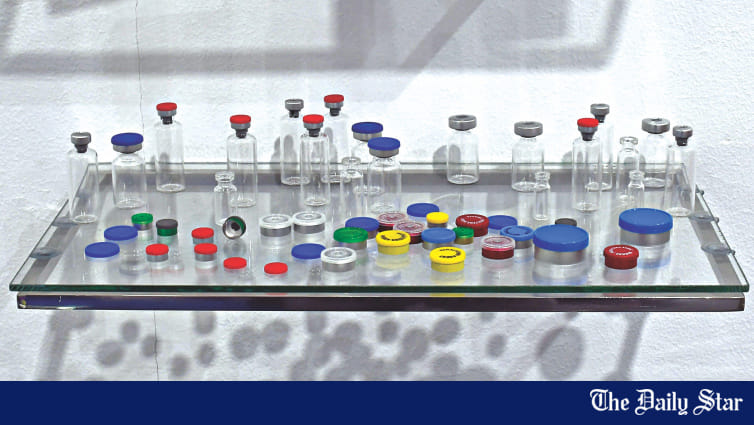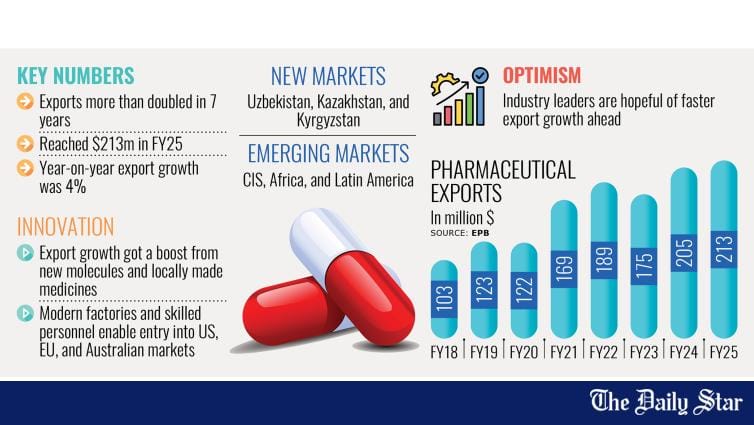- Joined
- Jan 24, 2024
- Messages
- 3,814
- Likes
- 2,034

Pharma exports rise, but Feb slump raises eyebrows
Bangladesh’s pharmaceutical exports posted steady growth in the first eight months of the current fiscal year, buoyed by rising demand from developed markets, though a sharp decline in February raised concerns, industry experts said.www.thedailystar.net
Pharma exports rise, but Feb slump raises eyebrows
View attachment 15291
Bangladesh's pharmaceutical exports posted steady growth in the first eight months of the current fiscal year, buoyed by rising demand from developed markets, though a sharp decline in February raised concerns, industry experts said.
The sector earned $145.46 million from July to February of fiscal year (FY) 2024-25, a 7.1 percent increase from $135.81 million in the same period a year earlier, according to data from the Export Promotion Bureau (EPB).
Industry insiders attributed the growth to the increasing popularity of Bangladeshi pharmaceuticals in key Western markets, including the United States, Australia and Europe.
In February alone, the sector generated $13.02 million, lower than the $16.81 million recorded in the same month of the previous fiscal year, marking a 22.6 percent decline.
The drop was largely driven by recent cuts in US foreign aid and a temporary halt in medicine shipments to Vietnam and Cambodia, where business activities slowed during New Year celebrations, industry insiders said.
"Our exports have grown due mainly to increasing orders from the US, Unicef and the World Health Organization," said Muhammad Zahangir Alam, chief financial officer at Square Pharmaceuticals, one of Bangladesh's leading drug manufacturers and exporters.
Regarding the February decline, he said month-to-month fluctuations in shipments are common and depend on the timing of export orders.
"We have long-term agreements in place to supply products to our buyers, so such fluctuations do not largely impact our exports," he added.
Alam also said that Square Pharma does not accept export orders on credit from new buyers as part of its policy to ensure payment security.
Mohammad Ali Nawaz, chief financial officer at Beximco Pharmaceuticals Ltd, said export orders have remained steady, with continuous direct supply to the US government.
"During the first eight months of the current fiscal year, we have received strong export orders, including from developed markets such as the US, South Africa and Australia," he said.
Nawaz noted that the company's export orders have been growing consistently, reflecting a positive trend in international business.
"This steady growth in exports is a strong indication of the company's resilience and adaptability in a competitive global market," he said.
Monjurul Alam, chief executive officer of Beacon Medicare Ltd, a unit of Beacon Pharmaceuticals, said that although EPB data shows sluggish exports in recent months, pharmaceutical shipments are actually rising.
He explained that shipments usually slow in January and February, as exports to Vietnam and Cambodia, two key importers, pause during this period.
"This seasonal slowdown explains the slight drop in February export figures," he said.
EPB data shows pharmaceutical exports fell 22.6 percent in February from January.
Alam expects exports to rebound in April as shipments to Vietnam and Cambodia resume. "There is no reason to be concerned about negative figures for one or two months of shipments," he said.
While pharmaceutical export figures are not large, they are important for the country's image and the industry, he added.
Ananta Saha, international business manager at Renata Ltd., echoed Alam's sentiments, saying export orders have remained steady.
However, he noted that export growth has not been as fast as expected.
Despite the slower pace, Renata remains optimistic about its long-term international business prospects, he added.
The case for Incepta Pharmaceuticals Ltd. is different, as the impact of US aid cuts directly affected its exports.
Arefin Ahmed, executive director at Incepta Pharmaceuticals, said the company was significantly affected by the recent cancellation of US aid funding.
"We regularly supply a large quantity of medicine to several countries, including Bangladesh, under the US aid programme. However, the sudden cancellation of this funding forced us to cancel two major vaccine shipments," he said.
The canceled shipment comprised 2 million injection doses worth $2 million.
Ahmed said USAID has been a loyal customer of Incepta, which is Bangladesh's second-largest generic pharmaceutical producer after Pfizer, the U.S.-based pharmaceutical giant.
The unexpected cancellation disrupted operations, affecting both revenue and the company's commitment to supplying critical medicines, he said.
February slump is a blip and nothing to worry about.
We should reduce dependency of pharma exports to any single or regional market (Vietnam and Cambodia), spread out risks evenly.










































